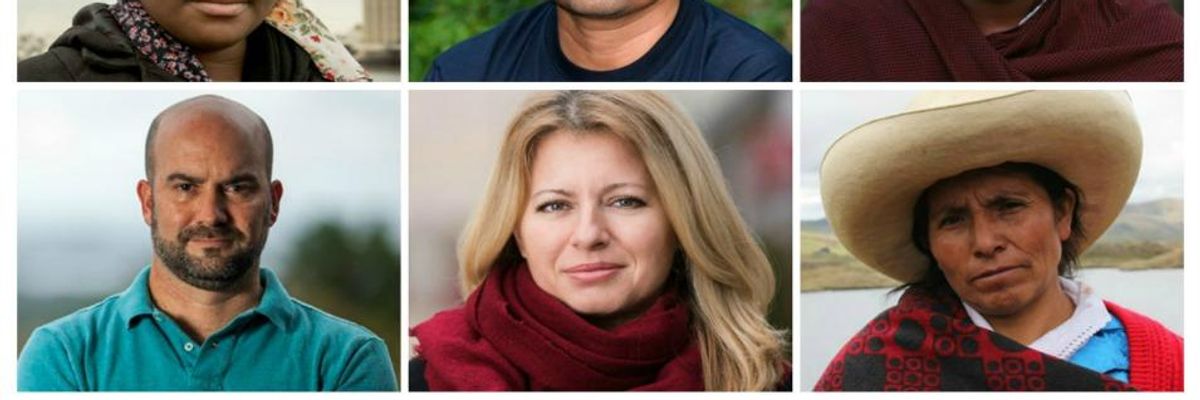A young woman from inner city Baltimore; a Cambodian anti-logging activist; a subsistence farmer in Peru's northern highlands; a grassroots Indigenous organizer in Tanzania; a Slovakian public interest lawyer; and a conservationist advocating for the endangered leatherback sea turtle in Puerto Rico.
These are the 2016 Goldman Environmental Prize winners--honored as heroes for their work protecting and enhancing the natural environment, often at great personal risk.
Established in 1989 by the late San Francisco philanthropist Richard Goldman and his wife, Rhoda, the prize is awarded annually; this year's ceremony will be live-streamed here starting at 5:30pm PDT Monday.
Among the 2016 recipients is 20-year-old environmental justice warrior Destiny Watford, who inspired residents of her heavily industrialized Baltimore neighborhood to defeat plans to build the nation's largest incinerator less than a mile away from two public schools.
Now a college student at Towson University, Watford was just a senior in high school when she learned about the proposed plant, which would have burned 4,000 tons of trash--brought in from outside the city--every day. Organizing with the student-led group Free Your Voice, Watford and fellow students hit the streets, canvassing neighborhoods, organizing protests, and circulating petitions.
According to the Goldman committee:
A huge breakthrough moment came when Watford and Free Your Voice students discovered that Baltimore City Public Schools (BCPS), along with other city government agencies and local nonprofits, had signed an agreement to purchase energy from the incinerator. In May 2014, Watford and her fellow students attended a school board meeting to urge them to divest from the project. Destiny gave a compelling presentation, students showcased art and music performances, and parents joined in with testimonies of support. They brought board members to tour Curtis Bay and the proposed incinerator site.
In February 2015, in response to concerns from students and their families, the BCPS board voted to terminate its contract with Energy Answers, the incinerator's developer. By the fall of that year, all 22 customers canceled their contracts, leaving the incinerator with no market for its product. The victory marked a moment of rebirth for Curtis Bay residents who finally felt that their voices were heard and that their health and lives mattered.
Public interest lawyer and mother of two, Zuzana Caputova, of Slovakia, was also recognized for her work fighting a waste dump, this one in Pezinok, the vineyard town in western Slovakia where she was born and raised.
Caputova's organizing, which the Goldman committee describes as "the largest mobilization of citizens since the 1989 Velvet Revolution," successfully galvanized peaceful protests and increased civic engagement, "inspiring citizens in the country to stand up for their rights to a clean and safe environment." In 2013, the Slovakian Supreme Court withdrew permission for a new dumpsite to begin operating in Pezinok, and ordered a decrepit dumpsite to shut down.
Also receiving the prize this year is Leng Ouch, 42, who went undercover in Cambodia to gather evidence of illegal logging activities, posing as a laborer, timber dealer, driver, tourist, and even as a cook. The resulting footage, which he publicly released, revealed the illegal logging practices of the country's biggest timber magnate, and exposed criminal collusion between timber companies and government officials at all levels of power.
As the Goldman committee points out, "Ouch's outspoken criticism of the government put him at enormous risk, in a country where environmental activism is dangerous--sometimes even deadly. Chut Wutty, an environmental activist and Ouch's former colleague, was brutally murdered in 2012; last November, a park ranger and police officer were gunned down while patrolling forests for illegal logging and poaching. Ouch has had to go into hiding at various times, and his family has been intimidated by military police."
But Ouch has persevered--and his work goes on. While the government, in response to public outcry, has canceled 23 land concessions covering 220,000 acres of forest, Ouch's goal is to stop the issuance of any more forest clearing licenses and to return the land to its rightful owners.
Common Dreams wrote about another of this year's prize recipients, Indigenous Peruvian farmworker Maxima Acuna, when she won a legal victory in 2014.
Acuna, 47, has for years fought legal and physical attempts by a mining company and its militarized security contractors to evict her from a plot of land she and her husband bought in 1994.
"I may be poor. I may be illiterate, but I know that our mountain lakes are our real treasure," Acuna toldNew Internationalist Magazine in 2012. "From them, I can get fresh and clean water for my children, for my husband and for my animals!"
"Yet," she continued, "are we expected to sacrifice our water and our land so that the Yanacocha people can take gold back to their country? Are we supposed to sit quietly and just let them poison our land and water?"
In 2014, a Peruvian appeals court struck down a lawsuit levied by the Yanacocha mine--which is 51 percent owned by Colorado's Newmont Mining Corporation--that had sought to expel and imprison the family for "invading" their own land. It was, as Common Dreams wrote at the time, "an important win in a case that has become a rallying point for local resistance to multinational plunder."
However, the Goldman committee notes, Acuna "continues to face threats and harassment."
"The mining company has built a fence around Acuna's land, restricting her ability to move about freely," the committee reports. "They have destroyed her potato crops, and maintain a close watch on her property to prevent her from planting more."
Learn more about Goldman winner Luis Jorge Rivera Herrera in this video:
Meanwhile, the work of pioneering prizewinner Edward Loure is explored below:
Honduran environmentalist Berta Caceres, who was murdered in March, was a Goldman Prize winner just last year.

